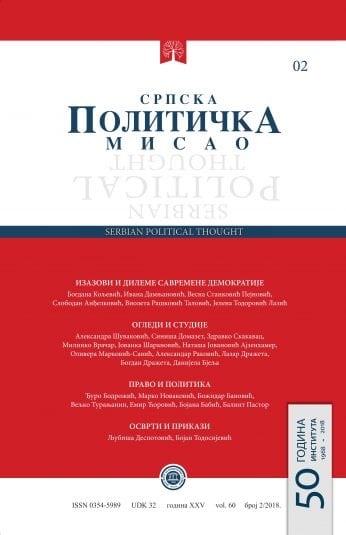Институционални услови конкуренције политичких идеја у Србији: случај регулаторног тела за електронске медије
Institutional Conditions for Competition of Political Ideas in Serbia: The Case of the Regulatory Authority for Electronic Media
Author(s): Siniša M. Atlagić, Jelena Surčulija MilojevićSubject(s): Media studies, Electoral systems, Theory of Communication
Published by: Институт за политичке студије
Keywords: political communication; electoral communication; media; Regulatory authority for electronic media; election; media law; Serbia
Summary/Abstract: This paper examines the institutional conditions of the Serbian society for existing of the competition of political ideas and visibility of different political options in the public sphere. In the first part, two phases of the Regulatory Agency for Elec tronic Media (REM) in Serbia are identified. First, period from its establishment in 2003 until the adoption of media laws in 2014, and second, from 2014 onward. In the first phase, REM almost exclusive ly dealt with election campaigns, despite having many other topics to regulate by adoption of bylaws (such as protection of minors, copyright and other). In its second phase, especially during the Presidential elec tion campaign in 2017, REM suddenly decided not to monitor the work of providers of audiovisual media services, but to react to complaints instead. The official ratio behind it was that there were no sanctions prescribed under the Law on Electronic Media, but also that the Law on Elections of Members of Parliament should deal with the media during electoral campaign. In the second part, the opposite interpretation of the Law on Electronic Media (LEM) is offered. Article 47, Para 1, Point 5. pre scribes that there should be “equal representation without discrimina tion to registered political parties, coalitions and individual candidates during the election campaign”. Further on, Article 28 of LEM introduc es measures for REM to enforce when providers of audiovisual services breach the rule of equal representation without discrimination. Those are rejection of the application for extension of the licence for offering of audiovisual services and not-issuing of the licence when in doubt that the provider of audiovisual services would not fulfil obligations related, among others, to equal presentation without discrimination of political actors during the election campaign. The final part of the research concludes that institutionalized conditions in Serbia do not allow competition of political ideas. It also determines that the role of the entire society, together with political elites, should be to strengthen independent institutions that monitor the work of the media, especially during election campaigns. To conclude, the proper regulation of media scene and imple mentation of such a regulatory framework has traditionally been com pleted when under pressure from abroad, only. The first drive was given by Council of Europe (CoE), for media laws passed in 2002 and 2003, as their adoption was one of the requirements for Serbia to become the CoE Member State. After Serbia has become the one, European Union has taken over the carrot and stick, so that major media documents, such as Media Strategy in 2011 or new package of media laws in 2014, were adopted as preconditions for Serbia to make a step forward on its European path. Therefore, shall we expect that the regulatory authori ty becomes a strong and independent Regulator, only when Serbia be comes close enough to its EU membership, so that such a body remains one of the prerequisites for Serbia to become the full member of the European Union?
Journal: Српска политичка мисао
- Issue Year: 2018
- Issue No: 3
- Page Range: 123-140
- Page Count: 18
- Language: Serbian

